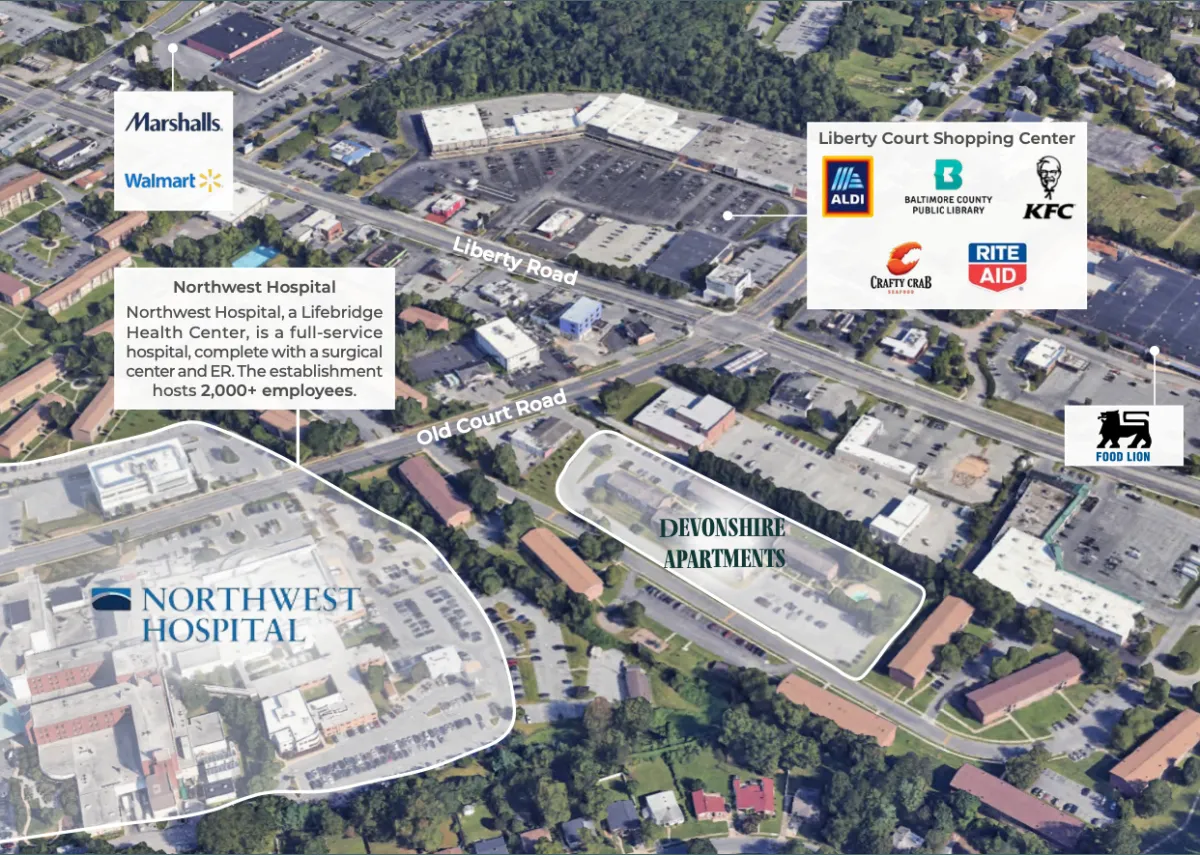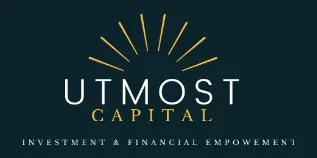This is your chance to passively own a 64-unit apartment community

Earn strong returns & enjoy powerful tax benefits
While solving the affordable housing crisis
The Devonshire apartment community has been loved and cared for by a single owner for over 30 years, but it's in need of repairs and renovations.
This area is in need of more high-quality, affordable housing. Help us provide just that to residents of Baltimore County.
Highly desirable location for workforce housing
Conveniently located near I-695 and I-795; numerous shopping centers located within a 2 mile radius
Major area employers nearby: Northwest Hospital, CareFirst, T. Rowe Price
Major area colleges nearby: Stevenson University, Towson University, Loyola University

Watch the property overview video below for all the details
Projected Returns
1.7 X average annual return
17.65% average annual return
6% preferred returns for all passive investors
75% of cashflow will go to passive investors, 25% will go to the operations team
Unique Benefits
Extremely experienced operations team with very strong track record
Eligible for Self-Directed IRA investments
Eligible for depreciation tax benefits
Helpful Resources

4 Smart Ways to Unlock Capital for Real Estate Investing
If you’ve ever wanted to invest in real estate but stopped short because you weren’t sure where the money would come from you’re not alone.
One of the most common questions I hear from professionals is:
“I want to invest in a syndication… but where do I get $50,000 or $100,000 to do it?”
The good news is: You may already have access to the capital you need you’re just not thinking about it the right way.
In this blog, I’ll walk you through four strategic, often-overlooked ways to fund your next real estate investment without relying solely on your checking account.
1. Tap Into Your Retirement Account (The Smart Way)
Did you know you can use your retirement savings to invest in real estate?
✔ If you have a Self-Directed IRA (SDIRA) or Solo 401(k), you may be able to roll over or borrow funds to invest in a real estate syndication.
✔ Some retirement plans allow you to borrow up to $50,000 or 50% of your account balance.
✔ The best part? You’re paying interest back to yourself so the cost of capital is effectively zero.
💡 This is one of the most underutilized tools for professionals with years of retirement savings but no idea they can redirect it into real estate.
2. Use Your Home Equity to Invest in Cash Flow
If you own your home, you might be sitting on thousands or even hundreds of thousands of dollars in idle equity that’s not earning a return.
Instead of letting it sit, consider using a:
Home Equity Loan
Home Equity Line of Credit (HELOC)
You can borrow against that equity at a relatively low interest rate, and use the funds to invest in a syndication with a higher projected return.
💡 If the investment produces enough passive income to cover the loan payments (or more), you’re effectively arbitraging your equity to build wealth faster.
Important: As with any leverage strategy, this approach should be used responsibly and ideally in lower-risk, cash-flowing investments with strong operators.
3. Borrow Against Your Whole Life Insurance Policy
If you have a whole life insurance policy, there’s a good chance you’ve built up cash value and that value can be borrowed against to fund an investment.
Here’s how it works:
✔ You take out a loan against the cash value.
✔ You’re not required to repay the loan.
✔ The amount borrowed (plus interest) is simply deducted from the death benefit later.
💡 This is a great way to make use of idle capital in your life insurance policy without surrendering it or affecting coverage.
It’s best used by investors who want to access capital without liquidating their other investments or assets.
4. Reallocate Underperforming Assets
This is one I see overlooked all the time:
Do you own property, land, or investments that aren’t producing the return you hoped for?
If you’re sitting on:
Raw land with no income
A rental that barely cash flows
An underperforming property that takes up too much of your time
…you might be better off selling it and reallocating that capital into a passive multifamily investment with better risk-adjusted returns.
💡 You’re not just freeing up capital you’re freeing up time, energy, and mental space.
Passive investing isn’t about giving up on real estate it’s about making your capital and time work harder together.
Final Thoughts: You Probably Have More Capital Than You Think
If you’ve ever said, “I want to invest, but I don’t have the money,” I encourage you to think bigger.
The capital may already be there it’s just locked up in traditional accounts, home equity, insurance policies, or underperforming assets.
As always, these strategies aren’t one-size-fits-all. It’s important to work with a trusted financial advisor to determine what’s best for your overall plan.
But if you’ve been waiting to invest because of funding?
You might be closer than you think.
📩 Want help reviewing your options or seeing how you could participate in our next deal? Let’s talk.
Why Investing Multifamily Builds Long-term Wealth:

Tax Incentives
Owning apartments comes with it’s own unique set of advantages - including powerful tax incentives that keep more money in your pocket.

Stability compared to stocks
Real estate is less volatile and has historically outperformed the stock market making it ideal for long-term growth.

Earn like a landlord, without being one.
The beauty of owning large apartment communities is utilizing professional property management to handle all of the day to day operations and maintenance.

Collective buying power
When we leverage the buying power of a group of investors we can buy larger, more stable properties with higher upside potential.

Got Questions? Curious to learn more?
NOTE: The information presented on this website, including but not limited to projected returns, financial estimates, and investment opportunities, is provided for informational purposes only and should not be construed as an offer to sell, a solicitation to buy, or a recommendation for any security or investment strategy.
Forward-Looking Statements:
Any statements regarding projected returns, future financial performance, or expected market conditions are forward-looking statements and involve certain risks and uncertainties. Actual results may vary significantly due to market fluctuations, economic conditions, operational risks, and other factors beyond our control. We make no guarantees, representations, or warranties—express or implied—regarding the accuracy, completeness, or reliability of such projections.
No Investment, Legal, or Tax Advice:
Nothing on this website should be considered investment, legal, or tax advice. Investors should conduct their own due diligence and consult with their financial, tax, and legal advisors before making any investment decisions. Investments in real estate syndications and private placements are speculative, illiquid, and involve a high degree of risk, including the potential loss of principal.
Accredited Investors & Regulation D Offerings:
Any investment offerings referenced on this website may be conducted under Regulation D, Rule 506(b) or 506(c) of the Securities Act of 1933, which require investors to be accredited investors as defined by the U.S. Securities and Exchange Commission (SEC). Participation in such offerings may require verification of accredited investor status and compliance with applicable securities laws.
No Guarantee of Results:
Past performance is not indicative of future results. Investment returns, distributions, and cash flow are not guaranteed and may be subject to market risks, operational challenges, and unforeseen circumstances that could impact investment performance. By accessing this website and any investment materials provided, you acknowledge and agree that Tiffany Ward, Utmost Capital Group, and any affiliated entities are not liable for any financial losses or investment decisions based on the information presented.

